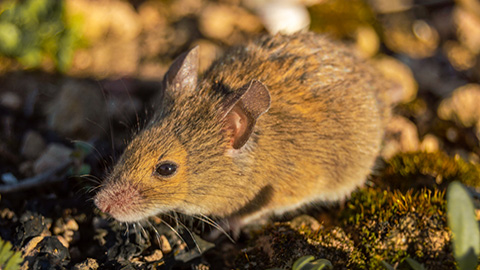Field mice have "personality"

09/05/2019
A pioneering research study conducted by CREAF and published in Animal Behaviour demonstrates the field mice (Apodemus Sylvaticus) have “personality”. Thus, just as humans, when faced with one same situation mice can make different decisions according to the "way that they are". Mariona Ferrandiz, researcher at CREAF and at the UAB and lead author of the study highlights that “What is most important is observing how individual mice behave and checking that each individual offers something different; that's unique”.
To conduct the study, researchers captured 25 mice in the Collserola hills of Barcelona and designed two experiments. In the first one, they analysed the behaviour of each mouse before, during and after adding to the terrarium cotton impregnated with the scent of their most voracious predator, the genet. They measured the time mice spent outside their den and how they behaved: if they were vigilant and motionless, tried to escape or find and destroy the genet-scented cotton, they were marked as feeling stressed. If they ate calmly, groomed themselves and dug in their den, they were relaxed.
The research demonstrated that the mice responded differently to the scent of a genet and that, according to Mariona Ferrandiz, "there was much variability among the mice. For example, the time they passed outside of their den varied from 45 minutes for the least active one to five hours with the mouse which was most active”. Therefore, individual characteristics are of more weight than the external environment.
Brave Mice Could Help Forests Escape From Climate Change
In the second experiment, researchers studied how mice distributed acorns. They measured the time mice spent outside their den, the distance they moved and the weight of the acorns under two conditions, with scent and without scent.
They verified that the most stressed mice were also the bravest and best distributors, given that they took the greatest risks, grabbed the heaviest and most nutritious acorns, and ran the longest distances. The more relaxed mice did not take as many risks, chose lighter acorns with less nutrients and travelled shorter distances.
Field Mice and Holm Oaks Working Together The former because acorns are a part of their diet and the latter because, thanks to the mice which distribute the acorns, they are able to reach places otherwise inaccessible. Climate change has brought about an increase in the need to study the survival of plants and the role played by seeds and the animals that distribute them. In the case of mice, previous studies assumed that all individuals behaved in the same manner and changes in decisions on how far to travel or which acorn to choose depended on external situations, such as the risk of other animals stealing the seeds of whether they could smell that a predator was near. This study helps to demonstrate that the "way of being" of each mouse also influences the process.
Although the study sheds some light on the dynamics of these small animals, the research cannot end here. "Now we are starting a new study in which we will compare dispersal patterns in a very old forest with another newly regenerated forest and we will examine whether there are differences in the dispersal method. Understanding these patterns would aid in planning the regeneration of a forest or create future strategies. For example, if the forest does not have dispersants we can look for ways to improve that", Mariona states.
The study was funded by the Ministry of Science, Innovation and Universities (MICINN) and forms part of the FORASSEMBLY project. The study was conducted by Mariano Feldman while he was doing his Master Thesis and is now a PhD student at the Forest Research Institute of the University of Québec; Mariona Ferrandiz-Rovira, CREAF and UAB researcher; Josep Maria Espelta, CREAF researcher, and Alberto Muñoz from the Department of Experimental, Social and Mathematical Didactics at the Faculty of Education of the Complutense University of Madrid.
Original article: Feldman M, Ferrandiz-Rovira M, Espelta JM, Muñoz A (2018). Evidence of high individual variability in seed management by scatter-hoarding rodents: does ‘personality’ matter?. Animal Behaviour, 150, 167-174.